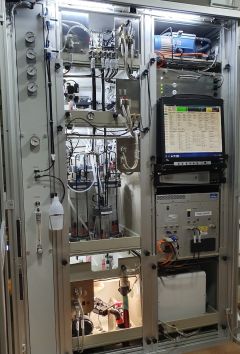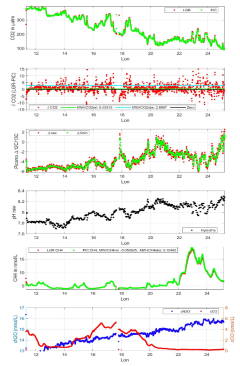

Continuous measurements of trace and greenhouse gases on the ferry Finnmaid
The Leibniz Institute for Baltic Sea Research Warnemünde (IOW) has been operating a system for measuring trace gases on the ferry Finnmaid since 2003. The Finnish ship of the Finnlines shipping company crosses the central Baltic Sea along the Travemünde - Helsinki route about every 2 days. The extension of the line by IOW for continuous measurement of carbon dioxide partial pressure (pCO2) in the surface water of the Baltic Sea started as an extension of the ALG@LINE project (SYKE, Helsinki). Since then, the fully automated equilibration facility has been extended step by step over the years to include further parameters and measurement methods. In 2005, a module for the determination of oxygen partial pressure (pO2) was added. In 2009, methane (CH4) in surface water was realized for the first time using new spectroscopic methods (off axis integrated cavity output spectroscopy, oa-ICOS) within the BONUS+ project "Baltic Gas". In the framework of ICOS-D (Integrated Carbon Observation System-Germany) the measurement of nitrous oxide (N2O) and the stable carbon isotopy of carbon dioxide (δ13CCO2) was introduced last.
With the complete re-installation of the facility in November 2019, two independent equilibrator/auxiliary equilibrator units have been created with two independent measurement loops of CH4/CO2 and CO/N2O (loop 1) and d13C-CO2 and CO2 (loop 2). The unit further allows for O2 dual determination as well as pH, temperature, and salinity measurements.
As the only observing line in ICOS-D operating in a marginal sea, the line has exceptional importance in bridging the gap between land and ocean observations. Due to the strong changes in the Baltic Sea ecosystem caused by anthropogenic influences (eutrophication, warming), which have already been recorded over several decades, it is particularly suitable for investigating the effects of changed use or adopted environmental strategies on trace gas fluxes.
The obtained data will be made available in different databases (e.g. SOCAT, PANGEA, ICOS Carbon Portal) by means of automated data processing and will provide insights into:
- Understanding mechanisms of production and mineralization in the Baltic Sea ecosystem.
- Quantification of net biomass production, especially during the mid-summer nitrogen fixation phase
- Characterization of regional and interannual variability and long-term trends
- Balancing of gas fluxes at the water and sediment surface
- Changes in gas exchange due to upwelling events
- Effects of climate change on gas exchange such as eutrophication, acidification and oxygen scarcity in deep waters
- Determination of greenhouse gas fluxes as an indicator of ecosystem health
- Baltic Sea as a source and sink for atmospheric CO2 by balancing CO2 gas exchange.
- contribution to the calculation of the annual Global Carbon Budget and the IPCC report
- and much more...
Projects involved and interfaces to other projects
- C-Scope
- Dargo2025
- SOOP/BGC-ARGO
- JERICHO S3
- MOSAiC
- BONUS INTEGRAL
- ICOS-D
- BONUS Baltic Gas
- SOPRAN
- ALG@LINE

